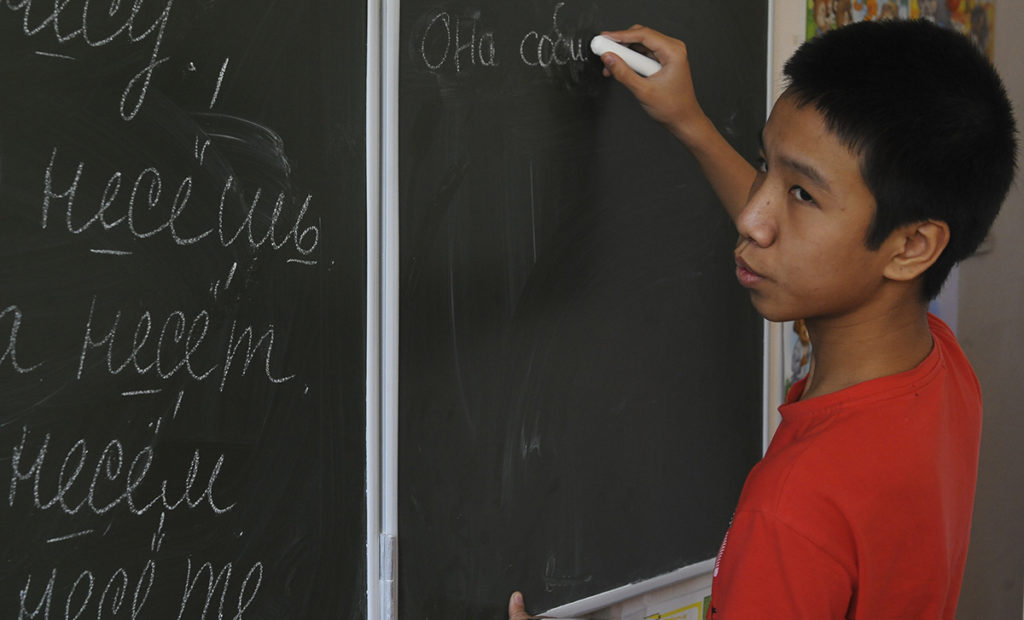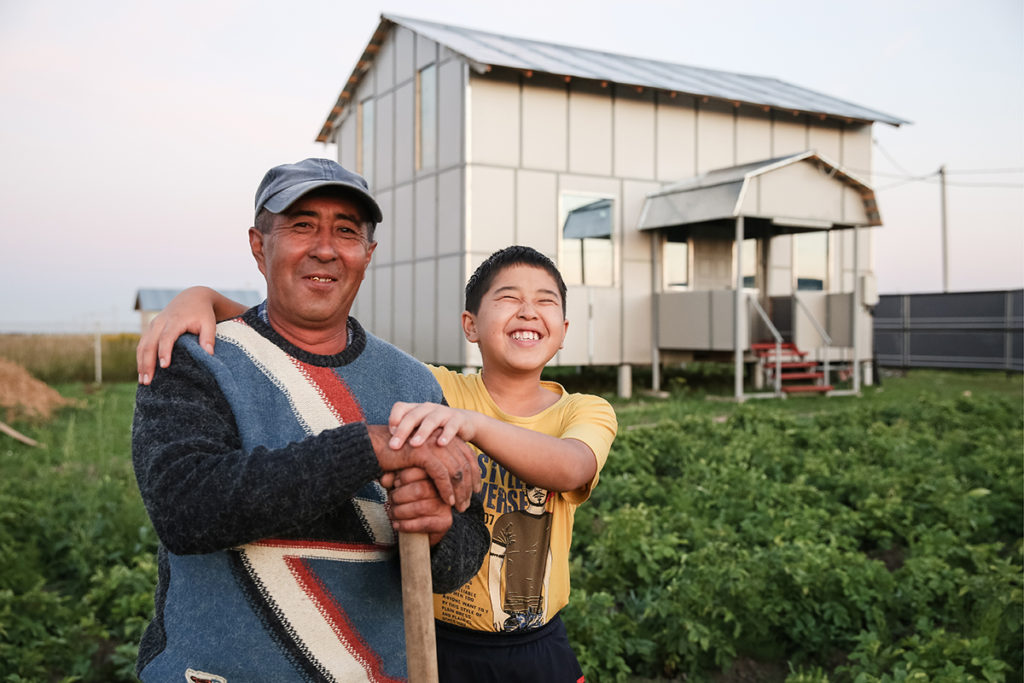“They speak Russian somehow wrong”: children of migrants are not taken to Russian schools From April 1, registration in the first grades is carried out according to new rules. Now everyone is checked for registration.
“They speak Russian somehow wrong”: children of migrants are not taken to Russian schools
Starting from April 1, registration for the first classes will be carried out according to the new rules. Now everyone is checked for registration. Because of this, many children will not be able to go to school. Migrants are at risk. What to do in such a situation, said Maria Krasova, a lawyer for the Migration and Law Network of the HRC Memorial, cooperating with the Civic Assistance Committee.

Photo: Maxim Kimerling/TASS
– Do you know any real cases when children of migrants were denied admission to school due to lack of registration?
– First we need to define who we consider migrants. As I understood from Vladimir Putin's speech at a meeting of the Council on Interethnic Relations, by migrants he means people who come from a non-Russian-speaking country, or for whom Russian is not the language of state communication.
However, is a child who comes from another subject of the Russian Federation considered a migrant, despite the fact that Russian is not his native language? Such children are also often refused on the grounds that they do not have registration in Moscow, or because they speak Russian somehow wrong. Such cases are quite common.
In February, we helped a refugee, a citizen of Russia, enroll his children in a school at his place of residence. The situation was completely absurd. Three children, two of whom graduated from 4th and 6th grades in Afghanistan. The Russian language was taught very actively, dad reacted to this as responsibly as possible.
In the education department, the children were sent to learn Russian even better, they refused to take them to school. We wrote a complaint to the Department of Education, then to the Commissioner for Children's Rights. They immediately called from the school, they say that they are ready to take all the children to the first grade. Girls 12-13 years old, this is not serious. Wrote a lawsuit to the court and the prosecutor's office. Within a week they called us and said: “Oh, okay,” and the issue was resolved.
Our country has signed an agreement with the Kyrgyz Republic, where Russian is considered the official language, on joining the Eurasian Economic Union. According to this treaty, Russia must provide all possible assistance and treat the citizens of these states as citizens of its own country. However, children from Kyrgyzstan are denied enrollment in schools on the grounds that they do not have registration in Moscow.
– Do schools refuse admission to the first grades more often, or does this also apply to primary, secondary, and senior levels?
“This applies to all children. We appealed to the Supreme Court, where we received an explanation that the school has the right to ask for registration only when the child is enrolled in the first grade and only in the order of the first priority.This means that the certificate of registration at the place of residence or stay must be provided to school only from April 1 to July 1, when there is a set of children living in the fixed territory. If there are free places, a certificate of registration is not required to enroll after July 1.
We can somehow confirm or not confirm the address of actual residence, however, in formal refusals to enroll the child of such a basis as the lack of registration or not knowledge of the Russian language, there is no. The only reason why he may not take him to school is the lack of free places there.
In Moscow, this is done purposefully

Photo by ITAR-TASS/Sergey Fadeichev
– Is this situation only in Moscow or is it typical for the regions too?
– In the regions, we see failures about registration not everywhere. There, as a rule, they strive to ensure that all places in schools are occupied, because financing of schools is per capita, and depends on the number of actually students. However, it is in Moscow that the Department of Education is engaged in legal nihilism.
In Moscow, such a policy is carried out purposefully. The city is growing rapidly, and the Ministry of Education is forced to artificially save space. If we talk about other regions, not so densely populated, then these are individual cases, which can be corrected by literally one call.
To make sure that in the capital this problem is systemic, it is enough to go to the Mos.ru portal and see what documents are needed to enroll children in school. Including, registration at the place of residence or place of stay is indicated, although it is enough to indicate the address of actual residence to submit the application. It can be confirmed by lease agreements and a number of other documents, however, MOS.ru does not accept such information, and when contacting the BTI database, the absence of data on registration of the child will issue.
I know the only school in Moscow, where the director accepts all children under his responsibility. I was very surprised at this practice, because we usually come across the opposite, and asked why she did this? She, in turn, was surprised at my question, and answered: “We are teaching children, not documents!”
– Do police officers impose on school principals?
– Absolutely, these are completely inconsistent with their functions, because in addition to checking the information about registration, school principals should also verify the legality of the child’s location in the Russian Federation.
Of course, migrants, if we are talking about the classical sense of the word, are afraid of everything. They are used to some strange position in Russia, completely unacceptable in a civilized society, and cease to fight, they accept everything as it is.
Among my customers there is a wonderful family from Uzbekistan. Here, in Russia, they faced a humiliating appeal, although dad was a police officer in their homeland, the children studied in the Russian gymnasium and speak Russian perfectly in Russian.When they arrived in Moscow, they began to get to school, they were told: In their Uzbekistan and study. This was said under the audio protocol, I have a record.
We have been serving for this family for three years. The boy grew up for a long time, entered the Higher School. But the school probably decided that the boy was not good enough for her.
– It turns out that in Moscow this is exactly an attempt to get rid of the who came up?
– Not really. This is a desire to get rid of the problems that will be from arriving who do not know or poorly know the Russian language. That is, the root cause is in the absence of communication. If visitors, refugees, speak Russian well, they will have no problems with admission to educational institutions.
It is important to understand that this is a systemic problem, and the teacher is not to blame for it. They cannot find a common language with students and parents literally, but only because they do not have special training, how to communicate with such families. Parents do not even understand what they write in school chats, it is difficult for them to explain what a parent meeting or excursion is, or today we bake pancakes on Shrovetide. So try to explain about pancakes on Shrovetide?
Therefore, school principals are insured and try not to take unnecessary problems for themselves. Putin said an important thing at the March meeting: there should be support not only for the children who were taken to school, but also for the school itself. Directors have a huge paper work, and together with water it happens that almost literally a child spills out.
It will not be clear to our class who will be taken to our class

Photo: Alexander Ryumin/TASS
-What to do to parents of a migrant child who was not taken to school?
– That's a very difficult question. There is a federal law On the procedure for considering appeals»who establishes that for obtaining a public service, a citizen can apply in any way convenient for him – in electronic form, in writing or personally.
In Moscow, such a practice has developed that in response to requests – written or personal – in the Department of Education they say: We have the only form of appeal – through the portal mos.ru. In all other regions, federal legislation is nevertheless respected, therefore, the departments of the local education system can be contacted personally. This increases the chances of success.
Moreover, we are increasingly meeting with the situation that the child is not taken to school for several years in a row. There are situations when a child of 14–16 years old, who is offered to enroll in grade 1 or 2, comes to the Civil Civil City Committee. In this case, we try to arrange him in a private school so that he will receive secondary general education in electronic form or at least an extermine.
If the deadlines have not yet been missed, and the child has more or less normal age, and if it is not about Moscow, it is possible to enroll it to school. We write to the education department, the Commissioner for the Rights of the Child of the Moscow Region.If this does not help, we contact the prosecutor’s office, and the issue is being resolved.
– Is there any hope that the situation with migrants will fundamentally change?
“It's hard for me to say, we are now about the middle of the journey.” Migrants and refugees are inclined to help mainly NGOs, and people are like this: They will not be understood into our class.
Frequent are cases when individual classes are formed, where only gypsies are recruited. They are citizens of Russia, but the attitude towards them is worse than to migrants. This is because they have their own sociocultural formats of communication, which do not always fit into generally accepted ones. And this is still good if they make such classes. More often, the school immediately refuses to take the gypsies. It does not matter what citizenship they have, the gypsies receive a refusal to reception in any case.
So far, we have no community of interests and views on human values that a person should go to school regardless of skin color, nothing will change. We even hear from the judges: Do you think you need to take all those who have come to schools? Therefore, optimism in this situation is close to zero in this situation. There is still a lot of work.




